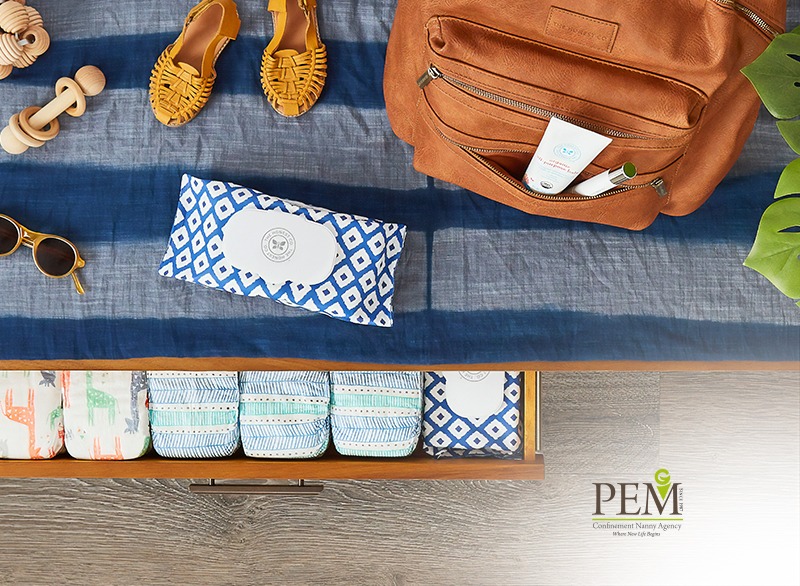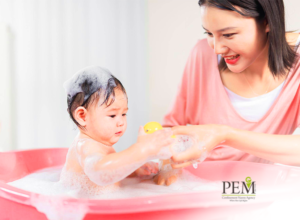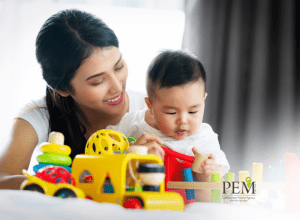[email protected] ♦ (+65) 6293 9249 ♦ Mon - Sun : 10:00AM - 7:00PM
The Ultimate Hospital Bag Checklist & More Before Your EDD!

A hospital bag is a bag of necessities that you bring to the hospital when it is finally time to deliver your baby. It should cover all the essentials you’ll need before and after your labour. Other than items for yourself, you should include items for your newborn and your husband too.
Bringing everything you need with you will make your hospital stay more comfortable. Furthermore, your family can also save the hassle of making multiple trips between the hospital and your home whenever you realize you missed something.
To ensure you pack everything you need, you can start packing early around your 35th week, and of course, using a checklist would help too. So here’s a complete hospital bag checklist to ease your packing.
Essentials For Mom
- Important Documents & Stationery
This includes your birth plan, identification card, insurance documents and any other hospital documents that are related to your pregnancy. Bringing your birth plan is especially important as it informs your medical team about your delivery preference on aspects such as pain management, newborn procedures and postnatal care. Remember to bring stationery for filling forms and documents too.
- Toiletries
Toiletries you should bring include toothbrush, toothpaste, shampoo, hair conditioner, shower gel, toilet paper, comb, hairbands and a travel-sized hair dryer. It is always a good idea to prepare your own toiletries as you wouldn’t know whether you’ll find the ones provided by the hospital suitable.
- Skincare & Light Makeup
Pack a facial wash, toner, moisturizer, eye cream, lip balm, and body lotion to keep your skin clean and hydrated at the hospital. Since you will be taking photos with your newborn, husband and other loved ones who come to visit, you can pack some light makeup and makeup remover too.
- Sanitary Pads
Bring plenty of sanitary pads to prepare for your post-delivery bleeding. The blood volume in your body will increase by at least 30% during pregnancy to nourish your growing baby. After not having period for the last 10 months, your postpartum bleeding is likely to be a very heavy period. Hence, maxi pads which are long and wide will be the best in this situation. Your post-delivery bleeding is likely to last for weeks, so you should prepare some maxi pads at home as well.
- Nursing Bras & Breast Pads
Aside from essentials for personal hygiene, bring breastfeeding essentials such as nursing bras and breast pads. For your nursing bras, choose bras with comfortable fabric and bras with clip design that you can undo single-handed while holding your baby in the other arm. As for breast pads, disposable nursing pads are convenient to use at the hospital.
- Breastfeeding-Friendly Clothes
Prepare tops, dresses and night wears that enable you to breastfeed easily and comfortably. You can pair your pajamas or night dress with a night-time nursing bra that can keep your breast pads in place. Furthermore, the clothes you bring should be slightly looser to fit your postnatal belly and bigger breasts. Remember to include your homecoming outfit too.
- Pillow & Blanket
Bring a pillow that you are familiar sleeping with, as hospital pillows may not be the most comfortable pillows out there. Pack a non-white pillow case to avoid your pillow getting mixed up with the hospital pillows. Furthermore, carry an extra blanket just in case it gets cold during the night. Your blanket doesn’t have to be too thick as the hospital will provide one too.
- Room Shoes & Socks
Bring room shoes to ease walking around your hospital room. Pick room shoes that are soft, comfortable and non-slippery. Since your legs are likely to be swollen from IV fluids and water retention, bring shoes that are easy to slip on. In addition, bring a few pairs of socks to keep your feet warm.
- Phone & Charger
You’ll probably remember your phone and charger even without this checklist, but we are still going to remind you just in case. As things might get hectic during labour, do not bring too many valuable devices to avoid losing them.
- Snacks & Sweets
Pack protein bars, dried fruit and nuts to keep you energized during labour. Choose snacks that are high in energy but also can be easily digested. Remember to only pack snacks that you’ve already tried and actually like, because this isn’t the best time to experiment. Pack your snacks in sealed plastic containers or zipper storage bags to keep them fresh. Labour can be a long day for your partner too, so get him to pack his own snacks as well.
Essentials For Baby
- Baby Clothes
Pack one homecoming outfit for your baby. You don’t have to bring too many baby clothes as the hospital will provide them for the first few days. Bring onesies that are suitable for 0 to 3 months newborns.
- Hat, Socks & Mittens
Bring a hat, a pair of socks and mittens for your baby. Your baby doesn’t have to wear them all the time. They are mainly to be worn by your newborn on the homecoming day when you leave the hospital.
- Baby Blanket
The hospital will have blankets to keep your baby warm, but you can always bring your own in case the ones provided are not very soft. Blankets are also useful to cover your baby on your car ride home.
- Diapers & Wet Wipes
Bring a few newborn diapers and unscented wet wipes to keep your baby’s bottom clean and fresh. When choosing diapers for your newborn, decide based on how absorbent and comfortable they are, and whether their fasteners are easy to use.
- Burp Cloths
Burp clothes are basically small handkerchiefs that will come in handy during feeding. As your baby is likely to spit up milk frequently, having burp clothes will keep your baby’s outfit clean. Bring two to three burp clothes so that you can wash and change them regularly.
Essentials For Dad
- Wallet with an identification card, driver’s license, credit card and cash.
- Phone, other electrical device and charger for entertainment while waiting at the lobby.
- Jacket as it can get cold in the hospital.
- Toiletries and a change of clothes in case he needs to stay overnight at the hospital.
You May Also Read this : What to Expect When Your EDD Is Approaching
Other Important Matters To Arrange
Other than getting ready for your trip to the hospital, you should be prepared for your trip back home too. Here’s a list of things to get ready for your new family member.
- Wash and Vacuum Your Car
A newborn’s immune system is weaker in the first few weeks after birth, and so will yours be after the labour. Hence, it’s important to clean the external and internal area of your car to keep it free of dust and germs.
- Get A Baby Car Seat
Getting a car seat is important for you to get your baby home safely from the hospital. When choosing a car seat, read your vehicle’s manual to understand which type of car seat is suitable. Pick a car seat that is easy to clean, and a convertible one that will last through your baby’s toddlerhood.
- Clean Your House
Your newborn’s skin is delicate and sensitive, so you want to make sure he or she comes back to a clean and safe home. Plus, once the baby reaches home, it would be more challenging to spend time on house cleaning. If you are looking for a deep and thorough cleaning, consider hiring a professional house cleaning service.
- Engage With A Confinement Nanny
Your newborn requires intensive care during the first few months after birth. With your body still recovering, the one month after you come home is likely to be overwhelming. To ensure both you and your baby gets the best postnatal care, engaging with a confinement nanny would be a great help. If you are looking for other moms with experienced, trained and licensed confinement lady to recommend, read all the excellent reviews on PEM Confinement Nanny Agency’s website!
Conclusion
We hope you have found this detailed list helpful when it comes to getting ready for your baby arrival. Best of luck with your delivery!







